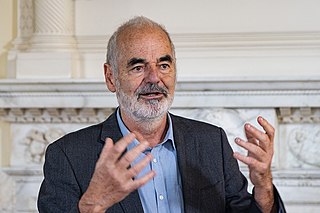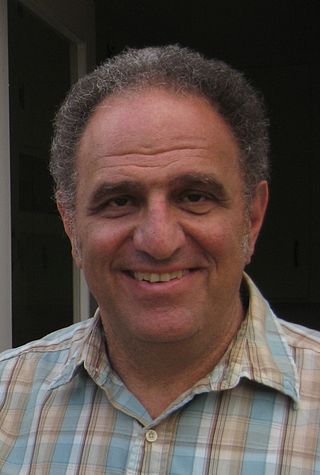Related Research Articles
In statistics, Markov chain Monte Carlo (MCMC) is a class of algorithms used to draw samples from a probability distribution. Given a probability distribution, one can construct a Markov chain whose elements' distribution approximates it – that is, the Markov chain's equilibrium distribution matches the target distribution. The more steps that are included, the more closely the distribution of the sample matches the actual desired distribution.

Sir David John Spiegelhalter is a British statistician and a Fellow of Churchill College, Cambridge. From 2007 to 2018 he was Winton Professor of the Public Understanding of Risk in the Statistical Laboratory at the University of Cambridge. Spiegelhalter is an ISI highly cited researcher.
Sir John Frank Charles Kingman is a British mathematician. He served as N. M. Rothschild and Sons Professor of Mathematical Sciences and Director of the Isaac Newton Institute at the University of Cambridge from 2001 until 2006, when he was succeeded by David Wallace. He is known for developing the mathematics of the coalescent theory, a theoretical model of inheritance that is fundamental to modern population genetics.

Sathamangalam Ranga Iyengar Srinivasa Varadhan, is an Indian American mathematician. He is known for his fundamental contributions to probability theory and in particular for creating a unified theory of large deviations. He is regarded as one of the fundamental contributors to the theory of diffusion processes with an orientation towards the refinement and further development of Itô’s stochastic calculus. In the year 2007, he became the first Asian to win the Abel Prize.
Jefferson Morris Gill is Distinguished Professor of Government, and of Mathematics & Statistics, the Director of the Center for Data Science, the Editor of Political Analysis, and a member of the Center for Behavioral Neuroscience at American University as of the Fall of 2017.
Sylvia Therese Richardson is a French/British Bayesian statistician and is currently Professor of Biostatistics and Director of the MRC Biostatistics Unit at the University of Cambridge. In 2021 she became the president of the Royal Statistical Society for the 2021–22 year.
Peter James Green, FRS is a British Bayesian statistician. He is emeritus Professor and Professorial Research Fellow at the University of Bristol, and a professor at the University of Technology, Sydney. He is distinguished for his contributions to computational statistics, in particular his contributions to spatial statistics and semi-parametric regression models and also his development of reversible-jump Markov chain Monte Carlo.

David Williams FRS is a Welsh mathematician who works in probability theory.
David George Clayton, is a British statistician and epidemiologist. He is titular Professor of Biostatistics in the University of Cambridge and Wellcome Trust and Juvenile Diabetes Research Foundation Principal Research Fellow in the Diabetes and Inflammation Laboratory, where he chairs the statistics group. Clayton is an ISI highly cited researcher placing him in the top 250 most cited scientists in the mathematics world over the last 20 years.
Stephen Peter "Steve" Brooks is Executive Director of Select Statistical Services Ltd, a statistical research consultancy company based in Exeter, and former professor of statistics at the Statistical Laboratory of the University of Cambridge.

Julian Ernst Besag FRS was a British statistician known chiefly for his work in spatial statistics, and Bayesian inference.

Robert Tibshirani is a professor in the Departments of Statistics and Biomedical Data Science at Stanford University. He was a professor at the University of Toronto from 1985 to 1998. In his work, he develops statistical tools for the analysis of complex datasets, most recently in genomics and proteomics.

Jeffrey Seth Rosenthal is a Canadian statistician and nonfiction author. He is a professor in the University of Toronto's department of statistics, cross-appointed with its department of mathematics.

Trevor John Hastie is an American statistician and computer scientist. He is currently serving as the John A. Overdeck Professor of Mathematical Sciences and Professor of Statistics at Stanford University. Hastie is known for his contributions to applied statistics, especially in the field of machine learning, data mining, and bioinformatics. He has authored several popular books in statistical learning, including The Elements of Statistical Learning: Data Mining, Inference, and Prediction. Hastie has been listed as an ISI Highly Cited Author in Mathematics by the ISI Web of Knowledge. He also contributed to the development of S.

Stuart Alan Geman is an American mathematician, known for influential contributions to computer vision, statistics, probability theory, machine learning, and the neurosciences. He and his brother, Donald Geman, are well known for proposing the Gibbs sampler, and for the first proof of convergence of the simulated annealing algorithm.
Jonathan Peter Keating is a British mathematician. As of September 2019, he is the Sedleian Professor of Natural Philosophy at the University of Oxford, and from 2012 to 2019 was the Henry Overton Wills Professor of Mathematics at the University of Bristol, where he served as Dean of the Faculty of Science (2009–2013). He has made contributions to applied mathematics and mathematical physics, in particular to quantum chaos, random matrix theory and number theory.
Elizabeth Alison Thompson is a British-born American statistician at the University of Washington. Her research concerns the use of genetic data to infer relationships between individuals and populations. She is the 2017–2018 president of the International Biometric Society.

Éric Moulines is a French researcher in statistical learning and signal processing. He received the silver medal from the CNRS in 2010, the France Télécom prize awarded in collaboration with the French Academy of Sciences in 2011. He was appointed a Fellow of the European Association for Signal Processing in 2012 and of the Institute of Mathematical Statistics in 2016. He is General Engineer of the Corps des Mines (X81).

Jesper Møller is a Danish mathematician.
References
- 1 2 Gareth Roberts at the Mathematics Genealogy Project
- 1 2 "Researcher Biography" (PDF). Archived from the original (PDF) on 25 June 2009. Retrieved 17 October 2009.
- ↑ Gareth Roberts publications indexed by Microsoft Academic
- ↑ Gareth Roberts Publications List
- ↑ "ISI Highly Cited Profile". Archived from the original on 19 May 2007. Retrieved 17 October 2009.
- 1 2 "ISI Highly Cited Profile". Archived from the original on 19 May 2007. Retrieved 17 October 2009.
- ↑ "Some boundary hitting problems for diffusion processes". University of Warwick Library. Retrieved 25 January 2013.
- ↑ "Great Northern Swiss Pairs". English Bridge Union . Retrieved 4 December 2016.
- ↑ "The Garden Cities Trophy – the history". English Bridge Union . Retrieved 4 December 2016.
- ↑ "Coventry and North Warwickshire Bridge Club win Garden Cities". English Bridge Union . Retrieved 4 December 2016.
- ↑ "ISI Highly Cited Statistics – Mathematics".
- ↑ Wales, The Learned Society of. "Gareth Owen Roberts". The Learned Society of Wales. Retrieved 31 August 2023.
- ↑ Professor Gareth Roberts FRS
- ↑ "Royal Society announces recipients of prestigious Wolfson Research Merit Awards". Royal Society. Retrieved 26 November 2018.